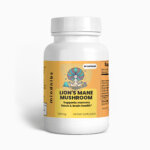
“The Mushroom of Memory: Lion’s Mane’s Impact on Brain Function”
We all know how important it is to take care of our brains. After all, our memories, thoughts, and overall cognitive function depend on it. But what if there was a natural way to boost brain function and potentially even improve memory? Enter Lion’s Mane, also known as the “mushroom of memory.” This unique fungus has been used in traditional medicine for centuries, and now scientific research is beginning to uncover its potential impact on brain function. In this article, we’ll explore the science behind Lion’s Mane and why it might be worth adding to our brain-boosting regimen.
1. Introduction: Harnessing the Power of Lion’s Mane for Improved Brain Function
Lion’s mane, scientifically known as Hericium erinaceus, is a mushroom that has been shown to have remarkable effects on brain function. This mushroom is rich in compounds that can help to improve cognitive function, memory, and overall brain health. If you’re looking for a way to harness the power of nature to boost your brain function, lion’s mane is an excellent option.
One of the main reasons lion’s mane is so effective at improving brain function is because it contains compounds that support the growth and survival of neurons. This mushroom has been shown to stimulate the production of nerve growth factor (NGF), a protein that plays a key role in the growth and maintenance of neurons in the brain. By increasing NGF levels, lion’s mane can help to improve cognitive function, memory, and other aspects of brain health.
In addition to supporting the growth and survival of neurons, lion’s mane also has anti-inflammatory properties that can help to protect the brain from damage. Chronic inflammation is a major contributing factor to many neurological conditions, including Alzheimer’s disease and Parkinson’s disease. By reducing inflammation in the brain, lion’s mane can help to protect against these conditions and improve overall brain function. So, if you’re looking for a natural way to improve cognitive function, memory, and brain health, adding lion’s mane to your daily routine is definitely worth considering.
2. The Science Behind Lion’s Mane and Its Neuroprotective Properties
The lion’s mane mushroom, scientifically known as Hericium erinaceus, is known for its unique appearance resembling the mane of a lion. The mushroom has been used in traditional Chinese medicine for centuries to help with various ailments. Recent studies have shown that lion’s mane has potent neuroprotective properties, which might help in treating neurodegenerative diseases such as Alzheimer’s, Parkinson’s and Multiple Sclerosis.
Lion’s mane contains two unique compounds called hericerins and erinacines that stimulate the production of nerve growth factor (NGF) in the brain. NGF is protein that is critical for the growth and survival of nerve cells. The production of NGF can stimulate the regeneration of damaged nerve cells and synaptic connections, leading to improved cognitive performance and memory. Furthermore, lion’s mane has anti-inflammatory and antioxidant properties that can help in reducing oxidative stress and inflammation, two factors that can contribute to cognitive decline.
Several studies have demonstrated the neuroprotective benefits of lion’s mane. For instance, a double-blind study involving older adults with mild cognitive impairment showed that taking lion’s mane for 16 weeks helped improve their cognitive function and memory. Another study found that lion’s mane might help prevent the formation of amyloid-beta plaques and neurofibrillary tangles, two hallmark features of Alzheimer’s disease. Additionally, research has shown that lion’s mane might help improve mood and reduce anxiety, two factors that can impact cognitive health.
In conclusion, is impressive. Lion’s mane contains unique compounds that support the growth and regeneration of nerve cells, reduce inflammation, and prevent oxidative stress. The research on lion’s mane and cognitive health is still in its early stages, but the initial results are promising. Adding lion’s mane to your diet or taking a supplement might be a simple and effective way to support your brain health and prevent cognitive decline.
3. Improving Cognitive Function and Memory Retention with Lion’s Mane
Lion’s Mane is a mushroom that has been used by Eastern medicine for centuries. Recently, researchers have been studying its cognitive benefits and have found that it helps with brain function and memory retention. It contains two compounds, hericenones and erinacines, which support nerve growth factor production and myelin sheath synthesis.
The myelin sheath covers nerve cells and is responsible for transmitting electrical signals and messages between neurons. Therefore, the consumption of Lion’s Mane can lead to better communication within the brain and ultimately improved cognitive function. It has also been shown to improve memory retention, making it a great supplement for students and professionals alike.
In addition to its cognitive benefits, Lion’s Mane has been shown to have anti-inflammatory and antioxidant properties. It helps protect against oxidative stress, which can cause damage to cells and lead to various diseases. By consuming Lion’s Mane, you are not only improving your brain function but also your overall health. Try incorporating Lion’s Mane into your daily routine, whether it be in supplement form or added to your meals, to experience its benefits firsthand.
4. The Role of Lion’s Mane in Reducing Stress and Anxiety
Lion’s mane is a mushroom filled with abundant benefits. Among its numerous advantages, it has been linked to help in reducing stress and anxiety levels in humans. Studies suggest that consuming lion’s mane extract can be beneficial for people who tend to feel anxious or stressed due to various reasons.
When consumed regularly, Lion’s mane has been known to support a balanced cortisol level. Cortisol is the hormone responsible for stress in our body. High cortisol levels can cause anxiety, weight gain, and other health problems. Lion’s Mane does an incredible job of bringing the cortisol levels back to balance, making it an excellent option for stress and anxiety management.
Through its neuroprotective properties, Lion’s mane has shown an impact on nerve cell growth and the significant potential for brain health. A healthy brain leads to a healthier mind, and a healthier mind implies reduced stress and anxiety levels. By including lion’s mane as a part of daily consumption, individuals can adapt to the increasing stress levels of modern life and establish healthy and positive mental resilience in their lives.
In conclusion, research proves that lion’s mane has remarkable benefits in reducing stress and anxiety levels in humans. With its neuroprotective properties, the mushroom has displayed fantastic impact on nerve cell growth and brain health in people. Added advantage of balancing cortisol levels makes Lion’s mane an excellent support for individuals dealing with stress, weight gain, anxiety, and other health problems. To improve mental resilience against the increasing stress levels in modern life, individuals can benefit from the regular consumption of Lion’s mane extract.
5. Enhancing Brain Plasticity and Nerve Growth with Lion’s Mane
Lion’s Mane is a medicinal mushroom that has been traditionally used in Asia for centuries. Recent clinical studies have shown that this mushroom has potential benefits for enhancing brain plasticity and nerve growth. These benefits make Lion’s Mane a promising natural supplement for those who want to improve their cognitive health and memory.
One of the ways Lion’s Mane enhances brain plasticity is by stimulating the production of a type of growth factor called nerve growth factor (NGF). NGF promotes the growth and survival of neurons, which are essential for the proper functioning of the brain. Lion’s Mane also stimulates the production of other growth factors, such as brain-derived neurotrophic factor (BDNF), which promotes the growth and differentiation of new neurons.
Another way Lion’s Mane enhances brain plasticity is by reducing inflammation in the brain. Chronic inflammation can damage the brain and lead to cognitive decline. Lion’s Mane contains compounds called polysaccharides that have anti-inflammatory properties. These compounds can protect the brain from inflammation and promote healing.
If you are interested in enhancing your brain plasticity and nerve growth, Lion’s Mane is worth considering as a natural supplement. Its potential benefits for cognitive health and memory are supported by clinical studies. Lion’s Mane can be consumed as a supplement in various forms, such as capsules, powders, or extracts. To get the most out of this mushroom, it’s recommended to take a standardized extract that contains a high concentration of its active compounds.
6. Other Potential Benefits of Lion’s Mane for Brain Health
While the primary benefit of Lion’s Mane is its ability to support brain health, there are also other potential benefits that should not be overlooked. Some of these benefits include:
- Reducing anxiety and depression
- Improving digestion
- Boosting the immune system
Lion’s Mane has been shown to reduce symptoms of anxiety and depression in multiple studies. This may be because of its ability to increase levels of nerve growth factor (NGF), which is essential for the growth and survival of nerve cells. NGF also plays an important role in decreasing inflammation in the brain, which can contribute to mood disorders.
Lion’s Mane may also help with digestion by improving gut health. This is because it contains polysaccharides that have been shown to promote the growth of beneficial gut bacteria. Additionally, Lion’s Mane has been shown to improve the permeability of the intestinal barrier, which can help prevent leaky gut syndrome.
Finally, Lion’s Mane may be beneficial for the immune system. It contains polysaccharides that have been shown to stimulate the production of immune cells and enhance their function. This can help the body fight off infections and diseases.
7. Conclusion: Incorporating Lion’s Mane into Your Diet for Optimal Cognitive Health
The scientific evidence supporting the benefits of Lion’s Mane for cognitive health and overall wellness is overwhelming. Whether you’re looking to improve memory, concentration, creativity, or overall brain function, incorporating Lion’s Mane into your diet is an excellent way to achieve your goals. Here are some tips for successfully adding this powerful mushroom to your diet.
First, look for Lion’s Mane supplements that are made from pure, high-quality ingredients. These supplements should ideally contain both the fruiting body and mycelium of the mushroom. This ensures that you’re getting all of the beneficial compounds that Lion’s Mane has to offer, including beta-glucans, hericenones, and erinacines. Start with a low dose and gradually increase as needed, monitoring for any adverse reactions.
In addition to supplements, you can also incorporate Lion’s Mane into your diet through food. Look for fresh or dried Lion’s Mane mushrooms at your local health food store or specialty market. These versatile mushrooms can be added to stir-fries, soups, stews, and other dishes for a delicious and nutritious boost. You can also use Lion’s Mane extract or tincture in recipes, such as smoothies or tea, to enjoy its cognitive benefits in a tasty beverage.
By incorporating Lion’s Mane into your diet, you can experience improved cognitive function, enhanced memory, and increased mental clarity. So why not give it a try and see for yourself how it benefits your body and mind? Whether you take supplements or add Lion’s Mane to your meals, this powerful mushroom is a valuable addition to any wellness routine. Don’t wait – start reaping the benefits of Lion’s Mane today.
The memory-enhancing properties of Lion’s Mane mushroom are impressive, and worth further investigation and exploration. It appears to be an effective way to enhance memory and boost brain function. As research continues to develop and expand, it is possible that Lion’s Mane may become a popular and natural supplement for those looking for a cognitive enhancer. Increasing access and availability of this mushroom supplement may also hold the key to further studies of cognitive benefits in the near future.

























